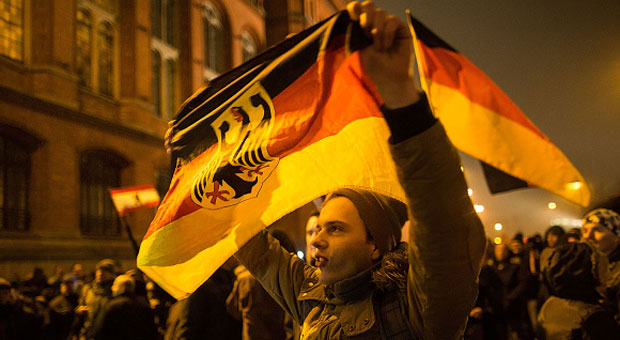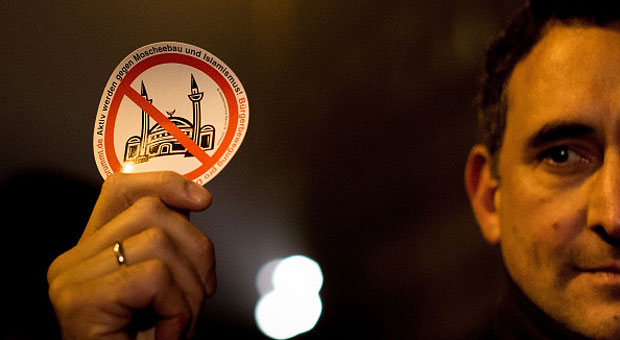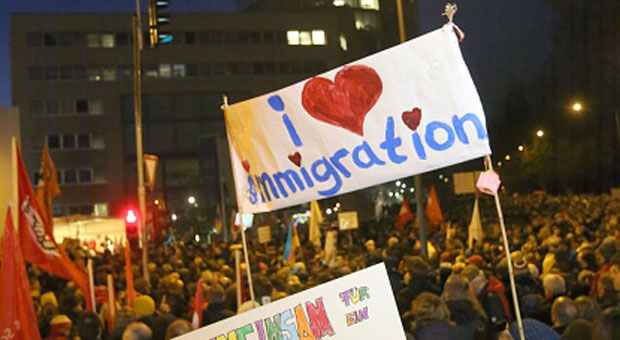Pegida: thousands attend anti-Islam rally in Germany
Rally against 'Islamisation of the West' attracts record crowds in Dresden, but other German cities protest against Pegida

A free daily email with the biggest news stories of the day – and the best features from TheWeek.com
You are now subscribed
Your newsletter sign-up was successful
A record number of people have taken to the streets of Dresden in eastern Germany to protest against what they call the 'Islamisation' of Europe, defying appeals from the government to stay away.
Police estimate more than 25,000 people attended the rally, organised by a group that calls itself Patriotic Europeans against the Islamisation of the West (Pegida), which has been staging weekly marches since October last year.
Organisers said the march was dedicated to the victims of the Paris shootings, but their opponents have accused them of attempting to capitalise on the terrorist attacks. While condemning the killings, the organisers "also took the opportunity to unveil a streamlined manifesto", the BBC's Jenny Hill reports.
The Week
Escape your echo chamber. Get the facts behind the news, plus analysis from multiple perspectives.

Sign up for The Week's Free Newsletters
From our morning news briefing to a weekly Good News Newsletter, get the best of The Week delivered directly to your inbox.
From our morning news briefing to a weekly Good News Newsletter, get the best of The Week delivered directly to your inbox.
However, the rally in Dresden sparked rival protests across the country with thousands attending demonstrations in Leipzig, Hanover and Munich against the far-right movement, carrying banners saying: "I am Charlie but not Pegida."
Despite its popularity in Dresden, "the movement has had trouble gaining traction elsewhere in Germany", with counter demonstrations in support of unity and tolerance much more prevalent, German paper Spiegel reports.
Chancellor Angela Merkel has announced that she will be attending a vigil organised by Muslim groups in Berlin today to honour the victims of the attack and to condemn violence and social division.
"Islam is part of Germany," she said, condemning the Pegida marches. "I am the chancellor of all Germans."
A free daily email with the biggest news stories of the day – and the best features from TheWeek.com
Several other senior German politicians, including Justice Minister Heiko Maas, had warned Pegida supporters not to "misuse" last week's terror attacks on the Charlie Hebdo magazine and Jewish supermarket in Paris to incite hatred against Muslims.
He also accused the group of hypocrisy. "In Dresden people want to remember with a black ribbon the victims in Paris - those same people whom a week ago they were calling the 'lying press'," he said. German cartoonists and journalists have also lampooned the group for hijacking the slogan "Je suis Charlie".
Pegida: Germany dims lights against 'pinstripe Nazi' protests
06 January
Rival rallies have been held across Germany as protests against the perceived "Islamisation of Europe" and immigration continue to grow.
A record 18,000 people attended protests organised by a group calling itself Patriotic Europeans against the Islamisation of the West (Pegida) in Dresden. However, in other parts of the country, counter demonstrators blocked the protests, criticising the group for its xenophobic message.
Pegida has been holding weekly protests since October, attended by just a few hundred people, but the movement has now begun to snowball.
Who is behind the protests?
Demonstrations have been organised by a grassroots group that calls itself Pegida. The group criticises Germany's political parties and the mainstream media for failing to act against what it sees as threats to German and European values.
It lists as its key aims the preservation of Western culture and thwarting the rise of radical Islam. It also calls for stricter immigration laws and limits to the country's refugee intake. Germany currently accepts more asylum seekers and refugees than any other EU nation.
Despite banning neo-Nazi symbols at its demonstrations, the group has been openly praised by known fascist organisations, The Independent reports.

What has the response been?
Counter rallies were held in cities across Germany, with anti-Pegida protesters outnumbering supporters in Berlin, Cologne and Hamburg and blocking their planned routes. "We are here to protect the Germany that we have become proud of," protesters told Deutche Welle.
In Stuttgart 5,000 turned out to protest against Pegida even though there was no rally planned there.
Churches, businesses and other organisations have joined the anti-Pegida movement. The lights on the Brandenburg Gate in Berlin and on Cologne's cathedral and bridges were turned off in protest against the rallies. Cologne's mayor said residents wanted to send a message that "we... do not want to have anything to do with right-wing extremists and xenophobic people".
Chancellor Angela Merkel, who is facing a growing political crisis over the demonstrations, has strongly condemned the anti-Islam protests, saying Pegida supporters have "hatred in their hearts", while other senior politicians have dubbed its leaders "Nazis in pinstripes".

Why are they significant?
At least 30 percent of all Germans say Pegida's concerns are legitimate, according to Deutche Welle and there are fears that the country's mainstream parties will be forced to push for harsher anti-immigration policies in the search for votes.
The BBC reports that, according to a survey by Stern magazine, one in eight Germans say they would join an anti-Islam march if Pegida organised one near their home.
Supporters of the movement include ordinary Germans, housewives, businessmen as well as football hooligans and known neo-Nazis, writes Volker Wagener. "The movement's scope is what's fear-inducing: it amounts to an eastern German general protest against multicultural western Germany," he says.
-
 Health insurance: Premiums soar as ACA subsidies end
Health insurance: Premiums soar as ACA subsidies endFeature 1.4 million people have dropped coverage
-
 Anthropic: AI triggers the ‘SaaSpocalypse’
Anthropic: AI triggers the ‘SaaSpocalypse’Feature A grim reaper for software services?
-
 NIH director Bhattacharya tapped as acting CDC head
NIH director Bhattacharya tapped as acting CDC headSpeed Read Jay Bhattacharya, a critic of the CDC’s Covid-19 response, will now lead the Centers for Disease Control and Prevention
-
 Epstein files topple law CEO, roil UK government
Epstein files topple law CEO, roil UK governmentSpeed Read Peter Mandelson, Britain’s former ambassador to the US, is caught up in the scandal
-
 Iran and US prepare to meet after skirmishes
Iran and US prepare to meet after skirmishesSpeed Read The incident comes amid heightened tensions in the Middle East
-
 Israel retrieves final hostage’s body from Gaza
Israel retrieves final hostage’s body from GazaSpeed Read The 24-year-old police officer was killed during the initial Hamas attack
-
 China’s Xi targets top general in growing purge
China’s Xi targets top general in growing purgeSpeed Read Zhang Youxia is being investigated over ‘grave violations’ of the law
-
 Panama and Canada are negotiating over a crucial copper mine
Panama and Canada are negotiating over a crucial copper mineIn the Spotlight Panama is set to make a final decision on the mine this summer
-
 Why Greenland’s natural resources are nearly impossible to mine
Why Greenland’s natural resources are nearly impossible to mineThe Explainer The country’s natural landscape makes the task extremely difficult
-
 Iran cuts internet as protests escalate
Iran cuts internet as protests escalateSpeed Reada Government buildings across the country have been set on fire
-
 US nabs ‘shadow’ tanker claimed by Russia
US nabs ‘shadow’ tanker claimed by RussiaSpeed Read The ship was one of two vessels seized by the US military